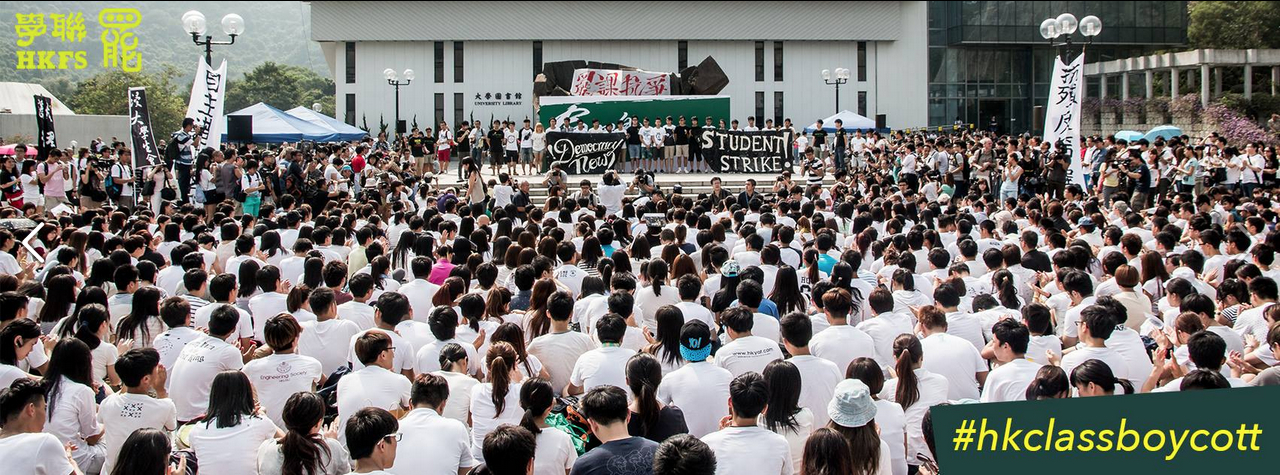The following censorship instructions, issued to the media by government authorities, have been leaked and distributed online. The name of the issuing body has been omitted to protect the source.
Do not report or carry coverage of the Hong Kong Federation of Students class boycott. Internet media are to control commentary. Immediately remove inflammatory language and images. (September 22, 2014)
香港学联发起大专生罢课一事不报道,不转载。网媒严格控制评论,煽动性言论和图片立即删除。 [Original Text]
Following the National People’s Congress Standing Committee’s ruling last month that candidates for Hong Kong’s chief executive must be approved by a Beijing-alligned nominating committee, thousands of university students in Hong Kong are boycotting class this week to support fully democratic elections in the special administrative region. Student organizers are reportedly drawing inspiration from protest movements far and near. The Hong Kong Federation of Students states that 13,000 people attended a rally Monday.
The New York Times quoted student leaders as the week-long boycott was beginning yesterday, and notes that high school students are expected to join the boycott later in the week:
“University students must shoulder the responsibility of these times,” Nathan Law Kwun-chung, the acting president of the student union of Lingnan University, told the crowd crammed into the main quad at the Chinese University of Hong Kong. Some held banners of their universities, and many others umbrellas to ward off the sun in this tropical former British colony.
“Boycotting classes is just the first wave of resistance,” Mr. Law said. “Today is not the last step for us all. It’s the first step, and countless resistance campaigns will bear fruit.”
[…] “We have to raise our bargaining power,” Alex Chow Yong Kang, the secretary general of the Hong Kong Federation of Students, said in an interview. “We have to tell them that Hong Kong people are willing to sacrifice much more.” [Source]
Also see the South China Morning Post’s three-part video report on 17-year-old Joshua Wong, who has been on the forefront of Hong Kong’s student pro-democracy movement for the last two years. Chinese state media has labeled the college freshman an “extremist.”
Reuters reports that Hong Kong students have given Chief Executive Leung Chun-ying 48 hours to speak to the public:
The ultimatum came after scuffles broke out when the students took their pro-democracy protest to government headquarters, where they pushed through barriers and rushed to meet Hong Kong leader Leung Chun-ying as he stepped out to meet the crowd in the Central business district.
Leung did not speak to the students but told reporters that any political reform would need to take into account Beijing’s wishes.
“If he doesn’t come to the community in 48 hours to have direct dialogue with the students and the people, and answer people’s questions, then we will definitely escalate the movement,” said Hong Kong Federation of Students leader Alex Chow, 24.
The students urged Leung to join them on a protest stage, reserving a chair for him to step up and address them, and threatening further action if he did not respond. They did not elaborate. [Source]
BBC reports that, staying true to the above guidelines, mainland media are largely ignoring the protests, instead shining light on Xi Jinping’s statement that Beijing’s policy “will not change.” The Diplomat reports on Xi’s stance, as expressed at a meeting with Hong Kong business interests in Beijing yesterday, drawing attention to one change in the president’s posturing:
In his remarks to the delegation, Xi stressed that the fates of Hong Kong and mainland China are intertwined — and both benefit from the guidance of the Chinese Communist Party. Since Hong Kong returned to Chinese control, Xi said, “the ‘one country, two systems’ [policy] has been practiced more thoroughly each day and Hong Kong has maintained its prosperity and stability.”
Xi Jinping also emphasized continuity. Beijing’s policy toward Hong Kong “has not changed and will not change,” Xi insisted. The CCP has always unswervingly pursued implementation of “one country, two systems” as well as Hong Kong’s Basic Law, Xi said, with an eye toward supporting both the development of democracy and safeguarding Hong Kong’s long-term prosperity and stability. “We are full of confidence in the mother country and Hong Kong’s future,” Xi said.
But South China Morning Post did note one apparent change in Beijing’s stance. Unlike his predecessor Hu Jintao, Xi did not use the phrase “high degree of autonomy” when speaking about Hong Kong. Instead, he said that Hong Kong is a “local administrative region that comes directly under the central people’s government.” […] [Source]
Also see commentary from Chinese activists Hu Jia, Teng Biao, and Yang Jianli, who warn that Beijing’s approach to the movement Hong Kong could lead to a situation resembling that which occurred in Beijing during the spring of 1989. For more on Hong Kong democracy and protest, see prior CDT coverage.







